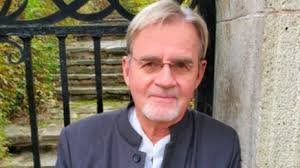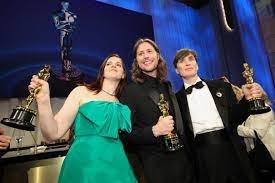New Delhi, Author Kai Bird, who co-wrote the biography of J Robert Oppenheimer that went on to inspire the Oscar winning film, says he visited the sets and excitedly went “Dr Oppenheimer, Dr Oppenheimer” when he met actor Cillian Murphy, dressed in character in a baggy brown suit and hat.
The 72-year-old confessed that his visit to the sets of the movie, which went on to win seven Oscars, including best picture and best actor, was a little boring.
The same scenes and dialogues were repeated and shot “like 15 times” from different angles but then came that encounter with the reel life Oppenheimer, considered father of the atom bomb.
“As he came over to me dressed in a baggy brown suit that looked like 1940s, in a silver belt buckle from New Mexico, the Oppenheimer hat. I jokingly cried out ‘Dr Oppenheimer, Dr Oppenheimer, I have been waiting to meet you for decades’, and he laughed,” Bird told PTI.
Bird, who wrote the Pulitzer Prize winning 2005 work along with the late Martin Sherwin, hopes the massive success of the film by Christopher Nolan sends a message to Hollywood and Bollywood filmmakers.
“I’m gratified by the Oscars, but I hope this sends a message to Hollywood and Bollywood that audiences are eager to see filmmakers tackle serious historical and biographical narratives. I was very pleased with the film myself. I think it is an artistic achievement,” he said.
Oppenheimer was a leading scientist on the Manhattan Project, a code name for the US government research project formed to produce the atomic weapon during World War II.
Bird and Sherwin were among the first in the long list of people that Nolan, who also wrote the script of the movie, thanked while receiving his maiden Oscar.
Sherwin, who died in 2021, worked on the book from 1980 until its publication in 2005. Bird joined as his writing partner in 2000 after a great deal of persuasion.
“Marty was persistent and kept coming back. He knew I was looking for a new book to write… and I didn’t have a job in mind. He said, ‘If you do not join me, my gravestone, my tombstone is going to read: He took it with him’. He was very witty,” recalled Bird.
The blockbuster success of the movie has rubbed off on the readership of the book, which Bird said has been on the New York Times bestsellers list for six months.
The book is now available in multiple editions across the world, including Chinese, French, Portuguese and Spanish.
“It is amazing, the book came out 18 years ago and now it has found a new life, a new much larger audience. When it came out it got very respectful reviews, it sold modestly, but it never got on any bestsellers list. But now because of Nolan’s movie it has been on the bestsellers list in the NYT,” Bird added.
He said there were at least “three attempts” to adapt the book into a movie for over a dozen years before Nolan entered the scene.
Three parties commissioned different screenplays and tried to get one of the studios to back the movie or a big star to do it. All turned out to be unsuccessful, Bird said.
“Nolan came along suddenly in the year 2021… he had read the book in March. He wrote the screenplay in the next four-five months, and only in September 2021 he called me and said ‘I have written the screenplay. I am picking up the option and I am making this movie’,” he recalled.
In Bird’s view, the controversial intimate scene in the movie, involving J. Robert Oppenheimer and his lover Jean Tatlock reading Bhagavad Gita in bed together, may have been both “improbable” and “inappropriate”.
Oppenheimer had learnt Sanskrit and was said to be influenced by Gita. The scene featuring a line from Hindu holy book led to protests in India.
“My wife said, ‘it was unnecessary’. In the movie he was trying to tell two things there: conveying Oppenheimer’s interest in the Gita, and in Sanskrit, and explaining his love for Tatlock. So maybe it was inappropriate to combine the two,” Bird said.












